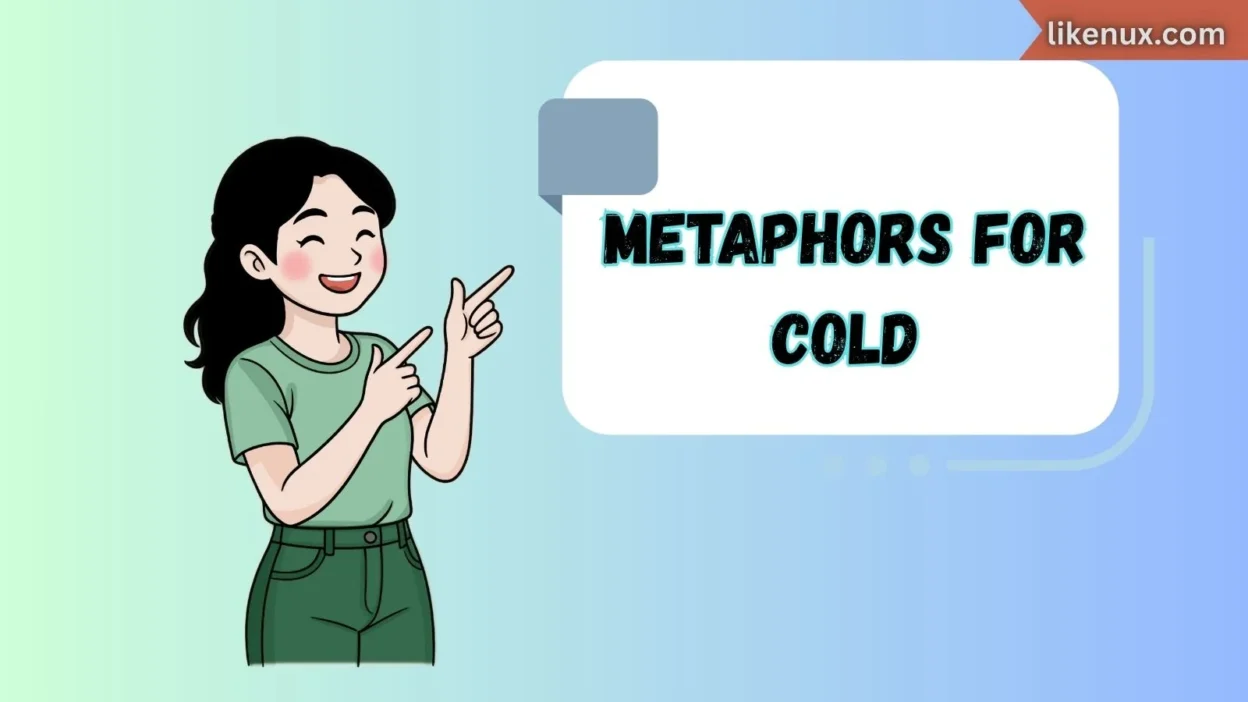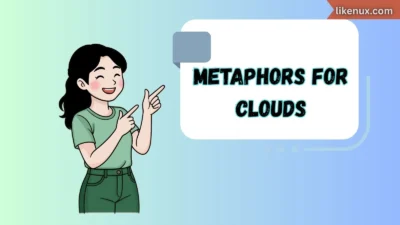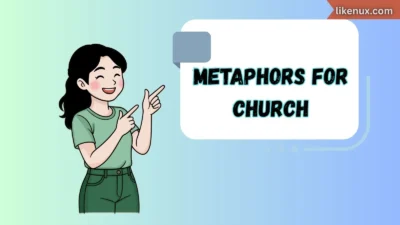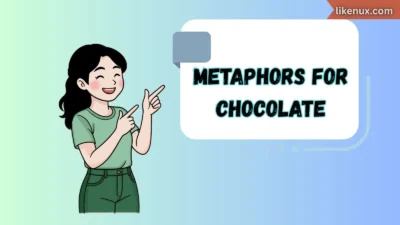Cold — it’s more than just a drop in temperature. It’s a feeling, a mood, and sometimes, a metaphor for distance, loneliness, or quiet strength. When we describe something as “cold,” we’re often trying to capture a deeper emotion — the stillness of a winter morning, the sting of rejection, or the beauty of a calm snowfall. In this article, we’ll explore 25 metaphors for cold that help express emotions and experiences with warmth, empathy, and creativity.
Whether you’re a student, writer, or someone who loves words, these metaphors will help you convey “cold” in ways that resonate with clarity and care.
1. Cold as Ice
Meaning: Completely lacking warmth or emotion.
In a sentence: Her stare was cold as ice, cutting through the room without a word.
Best use: To describe emotional distance or a chilling atmosphere.
Other ways to say: Frigid, unfeeling, icy-hearted, emotionless.
2. A Winter’s Whisper
Meaning: A soft but chilly reminder of solitude or calm.
In a sentence: The breeze carried a winter’s whisper, brushing past his cheeks.
Best use: Perfect for poetic or romantic writing about nature or nostalgia.
Other ways to say: Frost’s breath, winter’s sigh, quiet chill.
3. Frost-Kissed
Meaning: Gently touched by cold, often beautiful yet chilling.
In a sentence: The petals were frost-kissed, glimmering under the pale dawn.
Best use: Describing landscapes, mornings, or beauty touched by winter.
Other ways to say: Ice-touched, frozen grace, frost-covered.
4. The Chill of Silence
Meaning: The cold feeling that comes from stillness or emotional distance.
In a sentence: When he left, the chill of silence filled the room.
Best use: Reflective writing, emotional storytelling, or personal essays.
Other ways to say: Quiet freeze, muted frost, frozen stillness.
5. A Frozen Heart
Meaning: Someone who is emotionally closed off or unable to feel warmth.
In a sentence: Her frozen heart refused to melt even in his kindness.
Best use: To show emotional pain, heartbreak, or detachment.
Other ways to say: Cold-hearted, unfeeling, emotionally numb.
6. Snow-Covered Dreams
Meaning: Hopes that lie dormant or forgotten.
In a sentence: His snow-covered dreams slept beneath years of doubt.
Best use: Symbolic writing about lost ambition or nostalgia.
Other ways to say: Iced-over ambitions, frozen hopes, buried wishes.
7. Breath of Winter
Meaning: The sharp, invigorating presence of cold air.
In a sentence: The breath of winter filled her lungs, crisp and alive.
Best use: Describing atmosphere, weather, or renewal.
Other ways to say: Frosty air, icy breath, winter’s bite.
8. Cold Shadows
Meaning: The lingering feeling of fear, loss, or uncertainty.
In a sentence: The memory left behind cold shadows on his heart.
Best use: Emotional or psychological descriptions.
Other ways to say: Dark chill, frozen fear, icy echoes.
9. The Frost Within
Meaning: Inner numbness or emotional detachment.
In a sentence: She smiled, but the frost within her eyes told another story.
Best use: Emotional introspection or poetry.
Other ways to say: Inner chill, emotional frost, frozen soul.
10. The World Turned to Crystal
Meaning: A moment of still beauty under cold.
In a sentence: After the storm, the world turned to crystal, silent and pure.
Best use: Descriptive nature writing or visual imagery.
Other ways to say: Frozen wonderland, ice kingdom, crystal earth.
11. Bitter Wind
Meaning: Harsh or unforgiving cold that stings.
In a sentence: The bitter wind tore through the alley, unrelenting.
Best use: Physical or emotional harshness.
Other ways to say: Cutting air, sharp cold, cruel breeze.
12. Frozen in Time
Meaning: Stuck in a moment, unable to move forward.
In a sentence: That memory remains frozen in time, untouched by years.
Best use: Nostalgic or reflective writing.
Other ways to say: Trapped in memory, timeless freeze, paused moment.
13. Heart of Ice
Meaning: A person who is emotionally detached or ruthless.
In a sentence: Behind her charm hid a heart of ice.
Best use: Describing characters in fiction or emotionless behavior.
Other ways to say: Cold soul, icy nature, frosted heart.
14. Snow’s Silence
Meaning: The profound quiet that follows snowfall.
In a sentence: Snow’s silence fell over the city, wrapping it in peace.
Best use: Nature imagery or serene emotional tone.
Other ways to say: Winter hush, frozen peace, quiet blanket.
15. Frostbitten Memories
Meaning: Painful recollections numbed by time.
In a sentence: His frostbitten memories no longer hurt like they once did.
Best use: Emotional reflection or grief writing.
Other ways to say: Frozen recollections, cold memories, icy past.
16. A Glacier’s Pace
Meaning: Something moving extremely slowly.
In a sentence: The project advanced at a glacier’s pace, steady but sure.
Best use: Everyday expressions, patience metaphors.
Other ways to say: Slow progress, creeping pace, icy crawl.
17. The Cold Embrace
Meaning: A chilling but inescapable feeling or situation.
In a sentence: The night offered a cold embrace, one she couldn’t refuse.
Best use: Gothic or emotional prose.
Other ways to say: Frost’s hold, icy arms, winter’s grasp.
18. Frozen Breath
Meaning: A visible sign of life in the cold.
In a sentence: Their frozen breath danced like ghosts in the moonlight.
Best use: Visual or atmospheric storytelling.
Other ways to say: Misty exhale, frosty vapor, icy breath.
19. Cold Fire
Meaning: Passion or anger hidden under control.
In a sentence: His eyes burned with cold fire, fierce yet contained.
Best use: Emotional duality or restrained intensity.
Other ways to say: Controlled rage, icy passion, burning frost.
20. Winter’s Cage
Meaning: Feeling trapped by isolation or hardship.
In a sentence: The long nights felt like winter’s cage, endless and gray.
Best use: Emotional or poetic metaphors.
Other ways to say: Frozen prison, cold confinement, icy barrier.
21. The Chill of Truth
Meaning: The uncomfortable realization of something real.
In a sentence: The chill of truth hit harder than the wind.
Best use: Expressing awakening or realization moments.
Other ways to say: Harsh reality, cold fact, frozen honesty.
22. Snowblind
Meaning: Overwhelmed by beauty or illusion.
In a sentence: She was snowblind to his flaws, lost in admiration.
Best use: Describing naivety or enchantment.
Other ways to say: Love-blind, dazzled, enchanted.
23. Ice Veins
Meaning: Calm under pressure or emotionally cold.
In a sentence: He had ice in his veins, unmoved by the chaos around him.
Best use: Strong character traits or metaphoric courage.
Other ways to say: Unflinching, composed, cold-blooded.
24. Frozen Dawn
Meaning: A new beginning delayed or hidden by coldness.
In a sentence: The frozen dawn waited for the sun’s courage.
Best use: Symbolic writing about hope or perseverance.
Other ways to say: Delayed sunrise, winter dawn, icy morning.
25. Winter in the Soul
Meaning: A period of emotional or spiritual coldness.
In a sentence: He carried winter in his soul, waiting for spring’s warmth.
Best use: Deep emotional, spiritual, or reflective writing.
Other ways to say: Emotional frost, inner winter, cold spirit.
Frequently Asked Questions
1. What are metaphors for cold used for?
They help writers express emotions, settings, or moods that go beyond physical temperature — from emotional distance to serene beauty.
2. Are metaphors for cold always negative?
Not at all! Some represent peace, clarity, or renewal, while others reflect loneliness or pain.
3. How can students use cold metaphors in writing?
Students can use them to add depth, imagery, and emotion to essays, poems, or creative stories.
4. What’s the difference between a metaphor and a simile about cold?
A metaphor states something is cold (“her heart was ice”), while a simile compares it (“her heart was like ice”).
5. How can I make my metaphors sound natural?
Draw from personal experiences and observations — describe how cold feels to you emotionally or physically.
Conclusion
The language of cold is not just about shivers or frost — it’s about reflection, emotion, and transformation. Whether you’re describing a heart gone numb, a landscape glazed with frost, or the quiet peace of snowfall, these 25 metaphors for cold help bring your words to life with authentic warmth and emotional depth. Writing, like winter, reminds us that even in stillness, beauty thrives — and sometimes, the coldest moments hold the most meaning.

Andrew Christopher is a passionate visionary who blends creativity with purpose to bring ideas to life. With a focus on innovation and integrity, he inspires growth and lasting impact.



